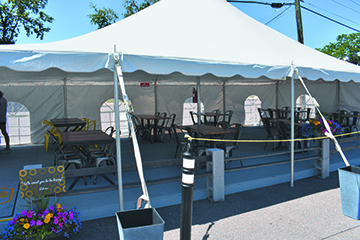
by Luke Schmaltz
On May 26, 2020, during a televised press conference, Colorado Governor Jared Polis made a statement that turned more than just a few service industry heads.
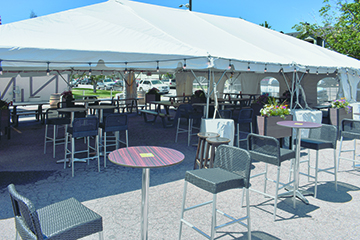
He suggested that Denver restaurants, upon reopening after the forced Covid-19 closure, commandeer adjacent outdoor areas, parking lots and even residential yard space so that they could increase their serving capacities under the current social distancing regulations. To many, the idea must have initially sounded farfetched and perhaps a bit naive. Yet now, for most establishments looking to resume business while complying with Department of Health regulations, this tactic may be their only hope.
Impossible Rules?
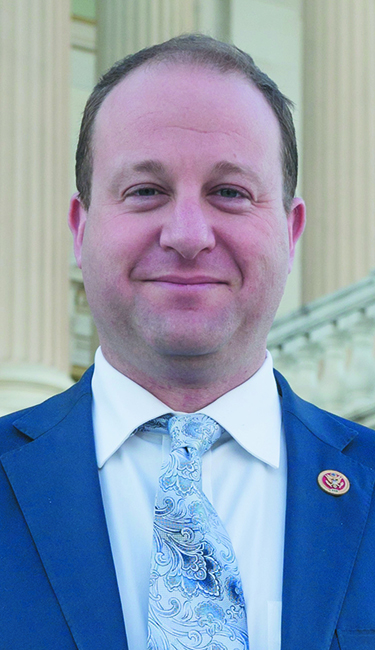
The restrictions on reopening are many and read like a restaurateur’s worst nightmare. Most involve distancing measures not only between patrons, but between employees as well (six feet seems to be a figure of ubiquity) and as anyone who has worked in a restaurant knows, following such a stipulation in a kitchen, behind a host stand, behind a bar or in a wait station is practically impossible. Navigating this turbulent stretch of the proverbial reopening waters seems daunting enough, that is, until you get to the part about capacity limits. All establishments must keep tables, yep you guessed it, six feet apart and can seat only up to 50% capacity or 175 people — whichever is less. Yet, realizing that restaurants employ 10% of Colorado’s workforce (300,000 people) leaders like Polis are urging proprietors and service professionals to get back to work — a crucial step in offsetting the economic disaster that looms on the horizon.
Uncertainty With A Side Of Harsh
So far, restaurants across the Mile High City in districts such as Glendale, LoDo and many others are getting creative with their proximal outdoor spaces. This unprecedented period of reopening could be deemed as a restaurant’s life support phase before either recovering enough to be released from the ICU or giving up and pulling the plug. After being shut down for three months (takeout and delivery notwithstanding) many places are simply unable to recover after such an extended hiatus from revenue and have already thrown in the towel. According to the National Restaurant Association, revenue losses through April 2020 are estimated at $80 billion and project to be as high as $240 billion through the end of the year. While (sadly) many restaurants forced to close are one-of-a-kind, mom and pop joints, several national chain restaurants are being forced into early retirement as well.
The New Abnormal
Despite the setbacks, some establishments with a loyal clientele and a strong identity across the neighborhood culture are attempting to forge forth. In doing so, however, they are forced to cut indoor capacities in half. This is where auxiliary external spaces turned into temporary seating areas can make a big difference. Bull & Bush Brewery (4700 Cherry Creek South Dr.) co-owners David and Erik Peterson have opted for a temporary exterior expansion. “So far it’s working out quite well,” David explains. “The waitstaff are all young, energetic and eager to work — so to them a few extra steps is no big deal.” While a recent Friday afternoon lunch service was moderately busy at best, Peterson was confident that the evening’s numbers would be many times greater — meaning that his overflow patio would indeed be helping circumvent the restrictions so that the restaurant could operate at an optimal capacity.
Another long time Glendale business, Shotgun Willie’s, has had to reimagine what their footprint looks like and how they can maximize their space while adhering to guidelines. When businesses were shut down, they shifted their sister company TBar (adjacent to Shotgun Willie’s) to a To-Go food and liquor business. They were even able to run some car washes during the warmer days to help generate some revenue which owner Debbie Matthews allowed her employees to keep. “I wanted to make sure when we reopened, that some of my most loyal and hard-working employees would come back,” said Debbie Matthews, owner of Shotgun Willie’s. “We got creative and kept Shotgun Willie’s and TBar on people’s minds. Now, having reopened, Shotgun Willie’s and TBar are seeing loyal customers return. They are both open for business at noon, seven days a week.
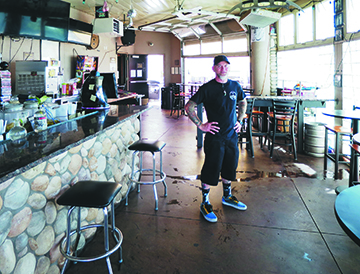
Unlikely Allies
While restaurant owners/managers have often found dealing with the Denver Department of Excise and Licenses to be highly challenging, getting approval for outdoor seating areas has been fast and easy for most. Whereas pre-Covid-19, garnering such clearance would have taken weeks or even months from an agency that is notorious for red tape, miscommunication and outright hostility toward businesspeople. Observations aside, the truth behind the sudden expediency is that on June 5, Governor Polis signed an executive order requiring that the Department of Revenue and the Liquor Enforcement Division respond to applications for extended seating/serving areas within 24 hours. The order allows restaurants to extend dining areas up to 1,000 feet of their entryways while allowing the consumption of alcoholic beverages within these areas as well.
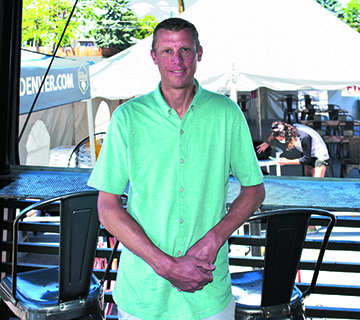
Determined Stalwarts
Meanwhile, Esters at 1950 S. Holly has expanded outdoor seating into the adjacent strip mall parking lot. A staff member explained that an application was recently submitted and approved — giving the place the green light to expand seating by 40 guests at the start of the third week of June. “This is not something we would have normally done,” said Paul Sullivan, owner of Esters Neighborhood Pub. “This gives us open air seating which I think people are looking for. The landlord at this location and the other tenants were cooperative on getting this going and adjusting to our new reality of what people want in a dining experience. I am thankful we are allowed to do this, I hope people enjoy it, and I feel this is going to help us survive this tough time.”
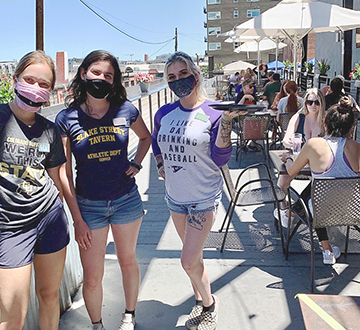
Further west into LoDo, longtime area staple Blake Street Tavern is ahead of the curve. Of the 700+ Denver restaurants who applied for additional patio space permits, they are already serving meals in their parking lot like their aforementioned Glendale counterparts. In a recent piece published by CBS4, owner Chris Fuselier states, “We’re in the beer garden business now. It’s all about outdoor dining.” Although Colorado is beloved for 300+ days of sunshine per year, that was not the case the day Blake Street opened their temporary beer garden, as violent winds showed up without a reservation and made for an interesting afternoon. This brings to light another potential issue: While the additional seating remedy is seasonal at best and better than nothing at all, inclement Colorado weather that hits hard and fast can cause inadvertent violations. Should an outdoor area need to be evacuated quickly, a bunch of patrons being herded indoors will take the social distancing regulations and scrape them into the trash bin.
Silver Linings
Perhaps on the brighter side, diminished capacity of all restaurants still in business as well as the closure of so many others could present a boon for places like Bull & Bush, Esters and Blake Street Tavern, as other establishments competing for the dollars of patrons could be at an all-time low. Yet the question remains whether a society that has been cooped up for three months is ready to go out to eat again, or if they are still skittish — content to stay at home and dine with caution.

